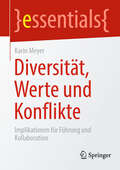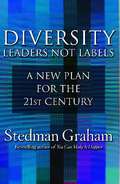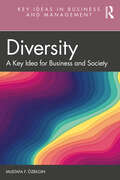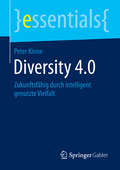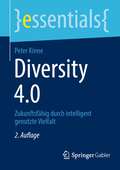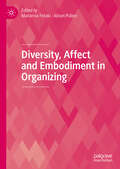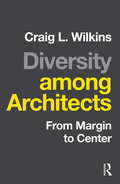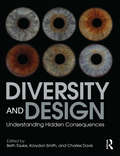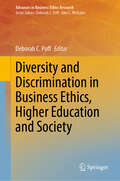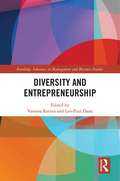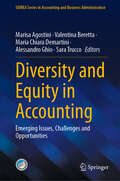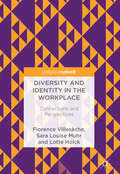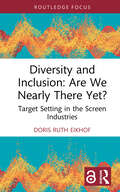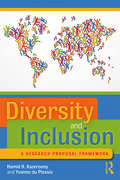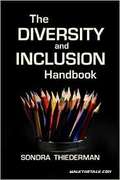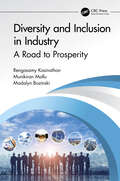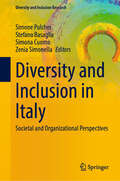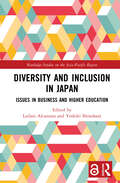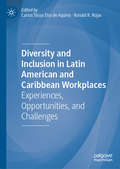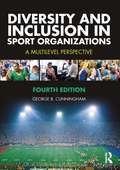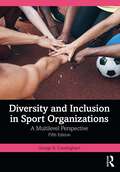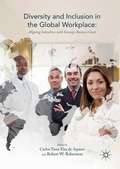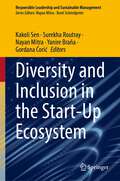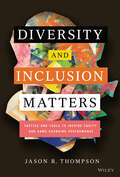- Table View
- List View
Diversität in Twinning-Projekten des Bundeskriminalamtes (BestMasters)
by Carola MeierCarola Meier geht in diesem Buch der Frage nach, ob Teilnehmende von Twinning-Projekten durchgeführt vom Bundeskriminalamt in Kroatien und der Türkei einen Einfluss von Diversität auf die Arbeitsdimensionen Kultur, Kommunikation und Kooperation wahrnehmen. Dabei ist die theoretische Befassung mit Diversitätsmanagement sowie dem EU-Förderinstrument Twinning als Basis essentiell. Die empirisch erarbeiteten Erkenntnisse aus Interviews mit 13 Teilnehmenden von Twinning-Projekten in Kroatien und der Türkei werden in den oben genannten Arbeitsdimensionen miteinander verglichen.
Diversität, Werte und Konflikte: Implikationen für Führung und Kollaboration (essentials)
by Karin MeyerDialog-, Konflikt- und Kollaborationsfähigkeit zählen zu den „Future Skills“. Gleichzeitig kann der Umgang mit Heterogenität (über-)fordern. Dabei ist es möglich, verschiedene Werte, Maßstäbe und Sichtweisen in Einklang zu bringen. Konflikte können vermieden sowie Potenziale und Kreativität unterschiedlicher Perspektiven erfolgreich genutzt werden, um in einer immer komplexer und dynamischer werden Arbeitswelt erfolgreich zu sein.
Diversity: Leaders Not Labels
by Stedman GrahamStedman Graham, bestselling author of You Can Make It Happen, teaches that in the 21st century your talent and skills above all else will define your value. In Diversity: Leaders Not Labels, Graham shows you how to break out of the box that keeps you from growing to your full potential, and reveals that success is truly based on results, performance, and excellence. Diversity is literally changing the face of our nations. Workers of all backgrounds are merging into a global marketplace, while businesses are challenged by a shortage of talent and the need to integrate a wide range of cultures. In this global environment, diversity has become a permanent business characteristic; opportunities will be plentiful for both people and businesses. Graham indicates that we do not have to become a member of anyone else's culture to play a key role, but must maintain and assert our own identities while respecting others' uniqueness in our workforces and communities. He helps us to understand that developing leaders rather than accepting labels is ultimately the best way to preserve culture and create a legacy. Diversity: Leaders Not Labels studies diversity as no one has before, exploring different cultures and their histories to help you understand that everyone has had challenges and that the transformation process is the same for each of us. Hard work, sacrifice, talent, and self-motivation are the tools you need for the future. By showcasing individuals who have successfully transcended labels to become leaders, Graham helps readers begin to move from their history to carving their own individual pathways to success, based on authenticity as well as the talents and skill they bring to the workforce. "What is most important is breaking through labels and understanding who you are," says Graham. "Realize that everyone brings uniqueness, talents, and skills that add value to our experiences, work environments, businesses, and communities. When you operate from this perspective, you will emerge in the 21st century as a true leader to yourself, to others, and to society."
Diversity: A Key Idea for Business and Society (Key Ideas in Business and Management)
by Mustafa F. ÖzbilginDiversity: A Key Idea for Business and Society introduces an idea that proliferates business and society, having been incorporated into mainstream theory and practice. Beyond this multidisciplinary setting, how diversity is defined, framed, managed and regulated is also exposed to considerable social, economic, political and ideological interpretation and manipulation. This volume explores definitions of diversity, its various manifestations and interdisciplinary influences that shape how diversity is researched. The text turns to workforce diversity as a particular case of diversity and explores antecedents, correlates and consequences of workforce diversity. The author considers power, inequality and intersectionality to illuminate the subject from the key manifestations, including class, gender, ethnicity, sexuality and disability. With insights from an array of fields from economics, through management to biology, the author also highlights the various cases against diversity alongside analysis of how to navigate the diversity jungle in practice. This concise, authoritative book will be essential reading for students, researchers and reflective practitioners interested in workforce diversity as well as unique supplementary reading across the social sciences.
Diversity 4.0: Zukunftsfähig durch intelligent genutzte Vielfalt (essentials)
by Peter KinneDas essential eröffnet neue Perspektiven für den Umgang mit sozio-kultureller Vielfalt in Organisationen. Es beleuchtet betriebswirtschaftlich-systemische Hintergründe, zeigt das Potenzial von Vielfalt zur Bewältigung von Komplexität, deckt Synergiepotenziale zwischen Diversity-, Qualitäts-, Innovations-, Marken- und Change-Management auf und liefert die Verbindung zu einer auf Ausgewogenheit basierenden, zukunftsorientierten Managementstrategie. Es beschreibt ein differenziertes Konzept, anhand dessen der Umgang mit Vielfalt zielorientiert geplant und so gesteuert werden kann, dass er nicht nur die Produktivität, sondern auch die Zukunftsfähigkeit von Organisationen verbessert.
Diversity 4.0: Zukunftsfähig durch intelligent genutzte Vielfalt (essentials)
by Peter KinneDas essential eröffnet neue Perspektiven für den Umgang mit sozio-kultureller Vielfalt in Organisationen. Es beleuchtet betriebswirtschaftlich-systemische Hintergründe, zeigt das Potenzial von Vielfalt zur Bewältigung von Komplexität, deckt Synergiepotenziale zwischen Diversity-, Qualitäts-, Innovations-, Marken- und Change-Management auf und liefert die Verbindung zu einer auf Ausgewogenheit basierenden, zukunftsorientierten Managementstrategie. Es beschreibt ein differenziertes Konzept, anhand dessen der Umgang mit Vielfalt zielorientiert geplant und so gesteuert werden kann, dass er nicht nur die Produktivität, sondern auch die Zukunftsfähigkeit von Organisationen verbessert.
Diversity, Affect and Embodiment in Organizing
by Marianna Fotaki Alison PullenBringing together research from critical diversity studies and organization theory, this edited collection challenges unspoken norms and patterns of discrimination in organizational bodies. The authors problematize the management of diversity by focusing on the differentiations between racialized, aged, gendered and sexed bodies. By taking a fresh approach and placing the body at the forefront of power relations, this thought-provoking book seeks to challenge the homogenizing and oppressive dimensions of organizational governance, structure and culture that deny bodily difference. An insightful read for scholars of HRM, diversity management and organization, Diversity, Affect and Embodiment in Organizing encourages an active approach to tackling discrimination and recognizes the diversity of embodied lives.
Diversity among Architects: From Margin to Center
by Craig WilkinsDiversity among Architects presents a series of essays questioning the homogeneity of architecture practitioners, who remain overwhelmingly male and Caucasian, to help you create a field more representative of the population you serve. The book is the collected work of author Craig L. Wilkins, an African American scholar and practitioner, and discusses music, education, urban geography, social justice, community design centers, race-space identity, shared landscape, and many more topics.
Diversity and Design: Understanding Hidden Consequences
by Beth Tauke, Korydon Smith, and Charles DavisDiversity and Design explores how design - whether of products, buildings, landscapes, cities, media, or systems - affects diverse members of society. Fifteen case studies in television, marketing, product design, architecture, film, video games, and more, illustrate the profound, though often hidden, consequences design decisions and processes have on the total human experience. The book not only investigates how gender, race, class, age, disability, and other factors influence the ways designers think, but also emphasizes the importance of understanding increasingly diverse cultures and, thus, averting design that leads to discrimination, isolation, and segregation. With over 140 full-color illustrations, chapter summaries, discussion questions and exercises, Diversity and Design is a valuable tool to help you understand the importance of designing for all.
Diversity and Discrimination in Business Ethics, Higher Education and Society (Advances in Business Ethics Research #9)
by Deborah C. PoffThis book engages the reader in a critical and necessary examination of the nature and range of behaviours that comprise diversity and discrimination in business and society. Discrimination and diversity are vitally important topics in the workplace as the manifestation of discriminatory practices leads to disfunction and a lack of effectiveness and efficiency in workplace settings. The chapters in this text not only conceptualize and clarify the meanings of diversity and discrimination but, as well, nicely unpack various debilitating features of the phenomenon and its various practices. This book is of particular interest to faculty teaching in schools of business, as well as researchers in business ethics and business management. As such, it provides an excellent venue for the exploration of the various negative impacts of diversity and discrimination.
Diversity and Entrepreneurship (Routledge Advances in Management and Business Studies)
by Vanessa Ratten Leo-Paul DanaWhilst there has been an increased interest in minorities and their contribution to society, the literature on minorities and under-represented communities is still weak. This edited volume discusses entrepreneurship in the context of minorities and the role they play in society. The book looks at under-represented communities such as LGBTQ+, disadvantaged, ethnic minority, religious entrepreneurs, medically limited, indigenous, refugees, young/old and other socio-economic segments. It provides a holistic, comprehensive overview of how diversity in entrepreneurship facilitates increased levels of innovation. The book will be amongst the first to take a broad perspective of minority entrepreneurs.
Diversity and Equity in Accounting: Emerging Issues, Challenges and Opportunities (SIDREA Series in Accounting and Business Administration)
by Sara Trucco Alessandro Ghio Marisa Agostini Valentina Beretta Maria Chiara DemartiniThis book discusses the role of diversity and equity in accounting, management control, governance, and auditing. These issues are increasingly relevant in both national and international debates. The volume analyzes recent literature and examines the role of diversity and equity as fundamental elements of corporate culture, determinants of the corporate growth model, and social justice. After framing the topic theoretically, the book conducts field analyses, collecting both secondary and primary data through qualitative and quantitative research methods, such as interviews, surveys, business case analyses, and documentary analyses of corporate practices on diversity and equity. The book provides an in-depth understanding and offers practical insights into the best (and worst) practices in diversity and equity within these fields. It will appeal to researchers in the social accounting domain and professionals seeking to integrate diversity and equity into business practices. The results presented are also relevant to policymakers who need to understand how to incentivize or regulate practices concerning diversity within corporate contexts.
Diversity and Identity in the Workplace: Connections and Perspectives
by Florence Villesèche Sara Louise Muhr Lotte HolckExamining the theoretical connections between identity and diversity, this new book explores how diversity management practices can be better informed by an enhanced understanding of the relationship between the two fields. Highlighting the relevance of identity to diversity studies, the authors concentrate on three key areas: social identity theory; critical perspectives on identity; and poststructuralist understandings. With the aim of fueling future research, this insightful book outlines a detailed research agenda and offers practical suggestions. Not only useful to academics, this book also seeks to encourage policy-makers and HR managers to develop current practices and make more research-informed management decisions.
Diversity and Inclusion: Target Setting in the Screen Industries (Routledge Research in the Creative and Cultural Industries)
by Doris Ruth EikhofThis book provides the first compact knowledge base on diversity & inclusion (D&I) targets in the UK screen industries. Drawing on new, in-depth industry research and progressive theoretical voices, the book will help readers understand what D&I targets are and what they could be in the future. The book explains different types of D&I targets, how D&I targets are currently used and how they might be developed to strategically drive inclusion. D&I targets are an increasingly common feature of the screen industries, but there is little evidence and guidance on how to use them well. This book addresses that gap. The book offers, for the first time, a unifying terminology for D&I target setting in the UK screen industries, including for transorganisational D&I targets (targets set by one organisation for another). It is based on a cross-industry review of D&I target setting in the UK screen industries, using evidence from industry and academic research. Providing a unique knowledge base on diversity & inclusion targets in the UK screen industries, this book will be of value to researchers, industry experts, practitioners, policy makers, campaigners and anyone who needs to understand D&I targets – to advise on them, to set and achieve them and to advocate for their effective, inclusive use.
Diversity and Inclusion: A Research Proposal Framework
by Hamid H. Kazeroony Yvonne du PlessisAimed at assisting doctoral candidates and early-career researchers and their supervisors globally, this book is the first of its type to address the challenges faced by students when proposing new programs of research in the disciplines of gender, race, identity, indigeneity, and diversity within management and business. The problems researchers face derive from a lack of familiarity with the needed alignment of the methodology, conceptual framework, and the nature of epistemologies used in creating a coherent proposal. This results in project delays and unnecessary time in review as doctoral students and committees attempt to provide the required alignment. Essential reading for students and faculty engaged in these fields of study, the book provides a practical guide on how to navigate through these challenges and to arrive at a workable proposal that meets the requirements of the academy. To assist doctoral students in conducting their research, the book provides narratives that illustrate the complexities of researching gender, race, identity, indigeneity, and diversity in broad terms. It explains the importance of such research in creating positive social change and helping students identify the appropriate conceptual framework, align the problem statement with a purpose, construct the research question and the nature of the study, and identify the correct method to conduct the research. An essential guide for students and doctoral researchers, this book explains the dominant and marginalized epistemological orientations to acquaint doctoral researchers with the effects of their selections on the outcomes of their research. It provides guidance as to the appropriateness of quantitative or qualitative methods based on the selected epistemology and the problem statement.
The Diversity and Inclusion Handbook
by Sondra ThiedermanWhy should diversity and inclusion matter to you and your organization? The answer lies in that one thing we all strive for: SUCCESS. When team members of all backgrounds are included, valued, and respected for their uniqueness and what they have to contribute, they truly are more creative, more committed, more collaborative, and more motivated to participate to the fullness of their potential.
Diversity and Inclusion in Industry: A Road to Prosperity
by Rengasamy Kasinathan Munikiran Mallu Madalyn BozinskiToday, more than ever, diversity, equity, and inclusion (DE&I) play a crucial role in organizational success, especially in industry, a sector that is sometimes overlooked. This book brings a new perspective on the implementation of diversity and inclusion in industry, including engineering, construction, manufacturing, etc. Data-driven longitudinal studies show the positive economic impact of diversity in these fields. A strong array of case studies is included, and the authors’ firsthand experiences provide information to industry professionals to help them understand the success and benefits that diversity can bring to these fields and how to embrace them outside of a corporate setting. FEATURES Discusses the DE&I role in the industry sector specifically Includes numerous case studies from industry giants and small companies Explains layers of diversity in line management Shows the correlation of diversity to the prosperity of companies over time Identifies diversity as an important tool for future growth This book is intended for professionals as well as students in upper-level undergraduate or graduate programs that are interested in or currently studying workplace diversity.
Diversity and Inclusion in Italy: Societal and Organizational Perspectives (Diversity and Inclusion Research)
by Simone Pulcher Stefano Basaglia Simona Cuomo Zenia SimonellaHistory, geography, culture, and the legal framework influence the dynamics of inclusion and exclusion in and around organisations. Yet, most academics and practitioners still approach themes of diversity in organisations relying on standardised discourses and practices, often transferred uncritically from the Anglo-Saxon context. Adopting a contextual approach that takes into account the specificities of the Italian context, this book explores a wide array of themes related to diversity and inclusion in organisations and society. Focusing on the Italian context, the book offers new insights into themes already well-established in the diversity debate, such as gender, age and disability. It also provides an opportunity to reflect on categories, organisational forms, and stakeholders rarely associated with diversity, such as social class, family businesses, and trade unions, but also to consider the role of technology and the arts as tools for both inclusion and exclusion. The contributions draw on different disciplines and perspectives and provide insights relevant not only with respect to Italy but also to other national and international contexts. This volume is aimed at both researchers and practitioners who wish to develop a more nuanced and mature understanding of diversity in organisations and society.
Diversity and Inclusion in Japan: Issues in Business and Higher Education (Routledge Studies on the Asia-Pacific Region)
by Lailani Alcantara and Yoshiki ShinoharaAlcantara, Shinohara, and their contributors evaluate the current state of diversity and inclusion (D&I) within business and higher education in Japan, and the importance of D&I to the growth of Japan’s economy and the enrichment of its society. Japan is widely understood to be a homogenous and patriarchal society, and while this is changing and was never wholly accurate, it certainly faces challenges in becoming more diverse and inclusive, particularly in its business and higher educational cultures. Grounded in research and offering best practices, the chapters in this book analyze critical issues relating to D&I in Japan at the individual, organizational, and industry levels. They present both a longitudinal analysis of the evolution and performance outcomes of D&I policies in Japanese corporations across industries, and rich studies of different underrepresented groups in Japan. These groups include immigrants, women, and people with disabilities. The contributors prescribe policies for promoting D&I in higher education, within businesses and at the governmental level. This book is an essential contribution to D&I discourse in the Japanese context that will be of great value to scholars of Japanese society and business, and an important extended case study for those looking at D&I more widely.
Diversity and Inclusion in Latin American and Caribbean Workplaces: Experiences, Opportunities, and Challenges
by Carlos Tasso Eira de Aquino Ronald R. RojasThis book explores the workplace experiences, opportunities, and challenges that emerge from the nuances of diversity and inclusion dynamics in Latin American and Caribbean countries. While the first part of the book addresses emerging frameworks on diversity and inclusion in Latin America by examining the effects of history, traditions, and cultural differences, the second part offers case studies of country-specific actualities. The authors highlight that despite the many shared cultural aspects of the region, it is not homogeneous and there are significant differences from place to place. It follows then that a variety of cultural differences implies a variety of approaches to workplace values, and more specifically, to the understanding of diversity and inclusion. Examining topics such as gender identity, disability, and racial gaps in countries throughout the region, this book offers scholars a fresh perspective on an emerging region.
Diversity and Inclusion in Sport Organizations: A Multilevel Perspective
by George B. CunninghamDiversity and Inclusion in Sport Organizations is a comprehensive introduction to the ways in which people differ - including race, sex, age, mental and physical ability, appearance, religion, sexual orientation, and social class - and the importance of these differences for sport organizations. It offers strategies for managing diversity in work and sport environments and provides an overview of diversity training that can be implemented in the workplace. Grounded in research and theory and outlining best practice, this fully updated and revised edition includes more international examples and expanded coverage of topics, such as critical disability studies, women of color, and LGBTQI issues, as well as useful teaching and learning features in every chapter and additional online resources. This is important reading for students working in the fields of sport business, sport management, sport development or sport coaching, HR management in sport, sport in society, sport participation, ethical leadership in sport, or introductory sport management courses.
Diversity and Inclusion in Sport Organizations: A Multilevel Perspective
by George B. CunninghamThis textbook is a comprehensive introduction to the ways in which people differ – including race, gender identity, age, disability, religion, sexual orientation, and social class – and the importance of these differences for sport organizations. Now in a fully updated and revised fifth edition, the book offers strategies for managing diversity and inclusion in work and sport environments. It also overviews strategies for creating and sustaining diverse and inclusive sport organizations. It considers how sport can be used to achieve positive social change. Grounded in cutting-edge research and theory, and focused on best practice, this edition includes new material on the important concept of intersectionality, as well as brand-new chapters on researching diversity and inclusion in sport, and strategies for reducing bias. It includes international examples in every chapter, as well as useful teaching and learning features, and supplementary resources for instructors are available online, including PowerPoint slides, chapter overviews, and a full test bank. This is important reading for any student taking a course in sport business, sport management, sport development, sport coaching, human resource management in sport, sport and social issues, sport participation, sport leadership, or the ethics of sport.
Diversity and Inclusion in the Global Workplace
by Carlos Tasso Eira de Aquino Robert W. RobertsonThis edited collection offers a nontraditional approach to diversity management, going beyond gender, race, and ethnicity. Examining ageism, disability, and spirituality, the book provides a discussion of different D&I applications and introduces a framework consisting of a diagnostic phase, gap analysis, and an action plan, which can be modified to attend to specific needs of organizations. Researchers and practitioners will learn a viable way to address diversity in global organizations.
Diversity and Inclusion in the Start-Up Ecosystem (Responsible Leadership and Sustainable Management)
by Kakoli Sen Surekha Routray Nayan Mitra Yanire Braña Gordana ĆorićThis book is about the lack of inclusion in the startup ecosystem for women entrepreneurs in India as well as the world due to which the challenges they face and how we can create inclusive ecosystem for women as well as other marginalised sections of the society. The twelve chapters of the book address a wide range of areas such as how entrepreneurship education may help create higher entrepreneurial intentions and how mentoring can help these first-time entrepreneurs set up, manage, sustain, and scale their startup. The international chapter authors in this book have written from different parts of the world such as Israel, Germany etc. and shared the challenges women or people from other marginalized sections of the society such as People with Disabilities across the world face. Some of the authors have written about sustainable businesses such as Green startups and green finance, revival of age old crafts by way of Diversity and Inclusion, how Covid has impacted women entrepreneurs and others. The chapters also offer action points that government, policy makers, incubators, accelerators, investors, universities can take up and create an integrated and inclusive eco-system that will offer end to end solutions for creating entrepreneurial intention among people from all walks of the society irrespective of gender, age, social status, disabilities, caste or creed. Anyone who is interested in becoming an entrepreneur or wants to help others who have entrepreneurial intention should read this book and see how it could benefit them as well as where and how they could contribute. Any corporate with an aim to extend their CSR activities and support these startups could learn how some other corporates are doing this. Aspirational women entrepreneurs could read it and find support at the right places.
Diversity and Inclusion Matters: Tactics and Tools to Inspire Equity and Game-Changing Performance
by Jason R. ThompsonExpert guidance and step-by-step instruction for building a successful diversity, equity, and inclusion initiative from scratch In Diversity and Inclusion Matters: Tactics and Tools to Inspire Equity and Game-Changing Performance, award-winning diversity, equity, and inclusion (DE&I) expert Jason R. Thompson delivers a practical and engaging handbook for implementing a DE&I program in your organization. The CAPE technique, developed by the author, gives you a clear blueprint and the tools you'll need to make your diversity program a success. In this book, you'll learn how to achieve early and significant wins to create the necessary and long term organizational change needed for successful DE&I programs. Find out what data you need to collect, how to analyze it, and choose the right goals for your organization. In addition, the CAPE technique will show your progress and ROI. You will learn to: Manage and lead a diversity council and implement diversity initiatives in the correct order Get early buy-in and long-term commitment from a Chief Executive Officer by knowing what to ask for and when Set appropriate and realistic expectations for a DE&I program with the executive leadership team Perfect for diversity and inclusion professionals, human resources leaders, founders, business owners, and executives, Diversity and Inclusion Matters will also earn a place in the libraries of students of human resources, leadership, management, and finance.

